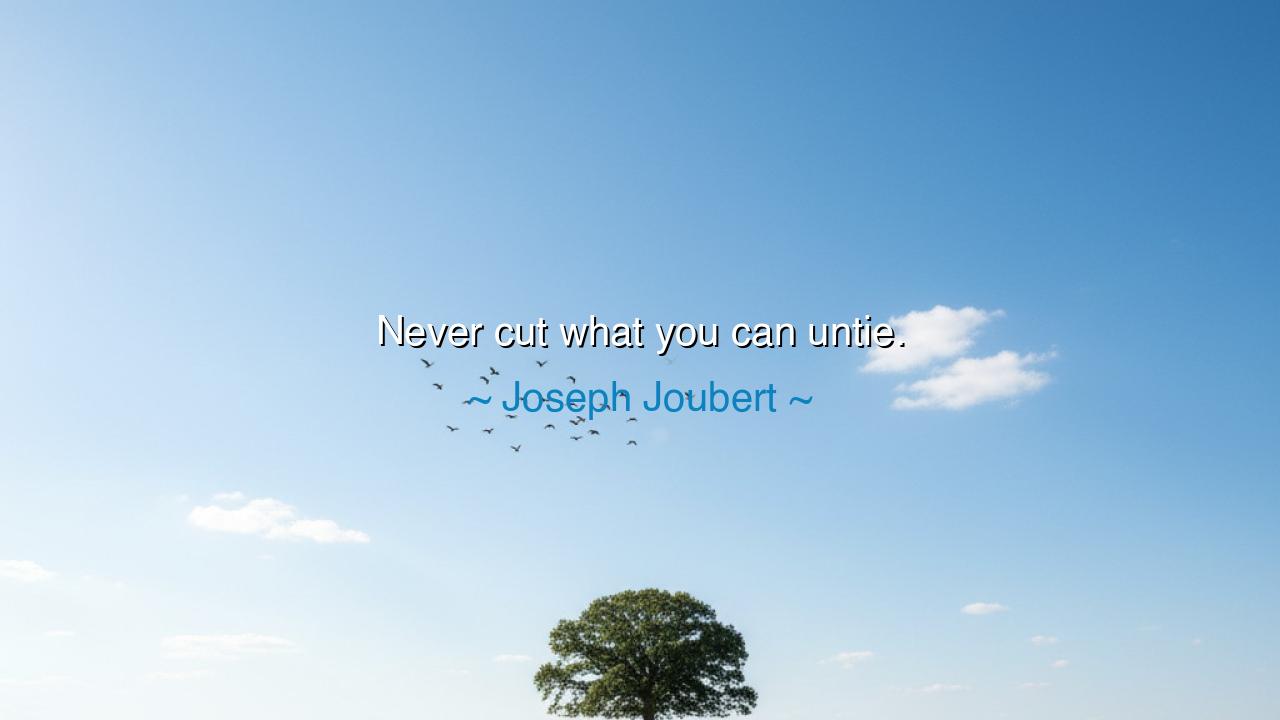
Never cut what you can untie.






Hear me, O children of wisdom, for the words of Joseph Joubert carry the weight of ancient truth: "Never cut what you can untie." In this simple but profound admonition, Joubert calls upon us to understand the power of patience, the value of deliberation, and the art of finding solutions not through hasty actions, but through the careful, thoughtful process of untying the knots that bind us. Too often, in our impatience and haste, we reach for the sword to sever what might, with a little care, be unraveled. The wisdom of Joubert teaches us that in life, as in the work of our hands, there is often a way forward that does not require destruction, but restoration and understanding.
In every moment of life, we are faced with tangled situations, complex relationships, and obstacles that seem impossible to overcome. It is the natural human inclination to act swiftly, to solve the problem with a sharp stroke, to sever the issue in one blow. But true wisdom lies in the act of untying, in taking the time to carefully understand what has been tangled and to gently work through the complexities with a steady hand. To cut is easy, but to untie is to engage with the matter at its core, to approach it with reverence and care. Joubert's words remind us that the path of patience often leads to a more lasting and more meaningful resolution.
Consider the example of King Solomon, renowned for his wisdom in the face of conflict. When two women came to him, each claiming to be the mother of the same child, Solomon did not react rashly. He could have quickly chosen a side, making a decision based on superficial appearances. Instead, he proposed a test that required both women to show their true nature. Solomon did not cut the situation short with a harsh judgment; instead, he untied the complexities of the matter, seeking to understand the true heart of the dispute. His careful, thoughtful approach revealed the truth, and the real mother was made known. In this, Solomon showed that wisdom lies not in cutting away the tangled parts, but in untangling them.
Thus, Joubert’s words carry a universal lesson for us all. Whether in matters of the heart, in the relationships we hold dear, or in the challenges we face in the world, it is far wiser to approach with the deliberation of untangling than with the impulse to cut. To sever ties quickly may give us immediate relief, but the damage done may leave us with greater scars than the patience required to solve the problem gently. Remember, the power to untie is a sign of strength, of a mind clear and calm, while the act of cutting is the mark of haste, often leading to regret.
So, my children, take this wisdom into your hearts: never be quick to cut what you can untie. Life is not a race to be solved through brute force, but a journey to be understood through patience and care. In your actions, whether they concern your own soul or the souls of others, seek to untangle with understanding, to find the delicate solutions that require both time and thought. In this, you will discover a greater peace, a peace that comes not from the destruction of the old, but from the careful restoration of what is worth preserving.






LNLinh Nguyen
Joseph Joubert’s words got me thinking—does this quote suggest that we should always take the less extreme route? It seems like it promotes finding flexibility and exploring options before making final decisions. But what about situations where cutting is the best option for efficiency? Are there instances when untangling the mess might just be more time-consuming than simply cutting it off? How do we know when one path is truly better than the other?
QNQuynh Nguyen
This is such a thoughtful quote, and I feel like it applies to so many areas of life. It speaks to the idea of patience and looking for alternatives before resorting to something permanent. But is it possible that constantly trying to untie might end up being just another form of procrastination? There must be a balance between patience and decisiveness, right? How do we figure out that balance?
MHTran Minh Hieu
I get the message here, but what about the more difficult situations where untying seems almost impossible? What if you're stuck in a complex issue that can't be easily undone or unraveled? Would the advice still hold? Maybe this is a call for mindfulness and restraint, but could it ever be more of a hindrance than a help, especially when action is required swiftly to move forward?
PMphuong minh
I love the idea behind this. It’s a great reminder to take a step back before making drastic choices. But what about those situations where time is of the essence? Can we afford to untie things when a quick decision is needed? I sometimes wonder if this approach could lead to missed opportunities, especially in high-pressure environments. Does patience always pay off in those cases?
NNNhy Ngo
This quote is really intriguing. It seems to suggest that when facing a problem or challenge, we should try to find ways to solve it without rushing into permanent decisions. I think there’s wisdom in that. But could this be a caution against overthinking? There are situations where it's clear-cut that action is needed. How do we know when to untie and when to just move forward with a solution?